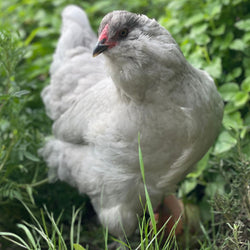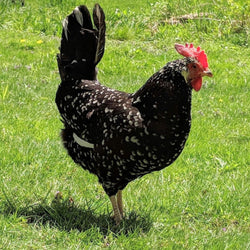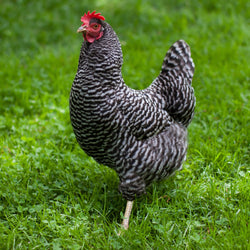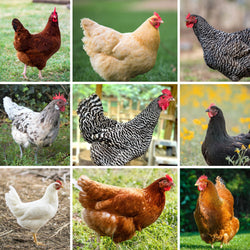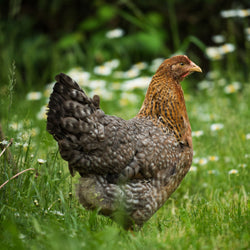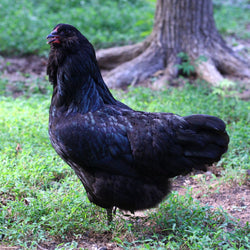page=1/--
Frequently Asked Questions
Here we answer the most commonly-asked questions about ordering, chicken care, and more.
How Long Does it Take a Chicken to Lay an Egg?
There's a certain magic in the act of collecting a freshly laid egg from your backyard coop—a tangible connection to the rhythms of nature and the reward of your nurturing efforts. But have you ever paused to consider the intricate journey that transforms a simple yolk into a fully formed egg? How Long Does it take to Lay an Egg? This whole process of egg laying from yolk to coop takes around 26 hours. As you savor the flavors of a meal made with your own homegrown eggs, take a moment to reflect on the incredible journey behind each bite. The...
Read MoreHow do brown eggs become brown (instead of white)?
The brown color in an egg is laid on in the chicken's reproductive tract by the shell gland pouch. Some breeds lay a tinted egg with a very light brown color, while others lay extremely dark chocolate brown eggs. From right to left: Marans egg, Welsummer egg, Rhode Island Red egg. Within a breed, too, hens can lay eggs darker or lighter than the average, depending on whether they produce more or less of the brown color that goes on the shell--and how long the egg stays in the "paint station" of the reproductive tract. Interestingly, individual hens--while they lay...
Read MoreIs there any nutritional difference between white, brown, green and blue eggs?
We like them all, Sam-I-Am! No, there is no difference in terms of edibility, health, or nutrition in different-colored egg shells. That said, the colorful eggs from your backyard hens WILL have much more nutrition, because eggs produced by hens raised on pasture are much healthier, indeed (and they taste much better, too). Keep in mind that commercially produced "free range" eggs may have been laid by hens who have never seen a blade of grass, the sun or the sky. "Pasture-raised" is something different, and much healthier. Eggs laid by hens raised on pasture have less fat and cholesterol,...
Read MoreCan you tell the sex of chicks when they're still in the egg?
There is no reliable way for the average home hatcher to tell the difference between an egg that will hatch a female chick and an egg that will hatch a male chick. In-ovo DNA testing and spectroscopy are being developed for certain applications, but most of us don't have this technology readily available at home! Instead, there are lots of old wives' tales out there, most of which have to do with the shape of the egg or which way a string swings when you hold it above an egg. In most cases, you will find that in one area...
Read MoreAre fertilized eggs okay to eat?
Fertilized eggs are fine to eat, in fact some people claim they healthier than unfertilized eggs, although we've never seen any data supporting that. (Let's be honest; if the fertile egg is fresh and unincubated, you're going to have the addition of just half a cell.) Illustration by Ray Yang for My Pet Chicken It is impossible to taste the difference between a fertile and an infertile egg, and barely possible to SEE the difference between a fertilized and non-fertilized egg with the naked eye. If you look closely--and if you have good vision--you will see that a fertile egg...
Read MoreHow do blue eggs become blue (instead of white or brown)?
Whereas the brown color of an egg is laid on the outside of the shell, the blue color actually goes all the way through the shell, even to the inside of the shell. Originally, it was thought that color pigments were synthesized in the blood by the breakdown of hemoglobin, but research shows it is more likely that they are actually synthesized in the shell gland pouch. The blue color is produced by biliverdin; the brown color is produced by protoporphyrin, and they are incorporated into the shell in different ways based on their different compositions. Again, to make it...
Read MoreCan different chicken breeds cross-breed?
Yes, they can! There are no problems associated with hatching mixed breed chickens. If you have a rooster in your flock, he will try to breed ALL your hens, nevermind if he is a different breed or even if the hens are different sizes, bantam and large fowl. It can be fun to hatch "mixed" eggs, because you never know what you'll get! Actually, many of the breeds we offer at My Pet Chicken are designer cross-breeds, and the results are spectacular: wonderful plumage colors, fantastic new egg colors, prolific egg-laying, friendly personalities and ultra-hardiness. For instance, we loved our...
Read MoreWhat is the best way to wash and store my eggs?
It's counter-intuitive but true: Your eggs will stay fresher if you don't wash them at all. When your hens lay eggs, there is a natural coating that is laid on top called the "bloom" that helps keep out bacteria. When you wash eggs, you can drive some bacteria in through the pores of the shell, so it's a bad idea to do so unless needed just before cooking as a general practice. If your nests are clean, your eggs should be clean. In fact, fresh eggs don't really even need to be refrigerated if they're going to be used soon....
Read More







"The Clubhouse" Coop
Easy to assemble and built to last, the Clubhouse Coop is the perfect starter coop for a small flock.

